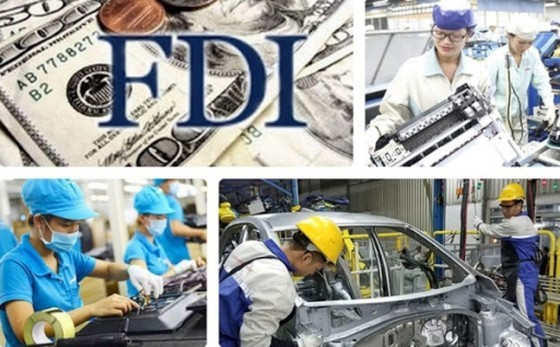
Accumulated losses
As of 31 December 2021, the total assets of FDI enterprises were VND 8,857,187 bln, up by 13.1 percent compared to 2020. Equity was VND 3,640,866 bln, up by 10.9 percent compared to 2020, of which the owner investment capital was VND 2,549,558 bln, up by 12.3 percent compared to 2020. Undistributed profit after tax was VND 944,468 bln, up by 8.8 percent compared to 2020.
This shows that the production and business activities of FDI enterprises in 2021 had increased, with revenue reaching VND 8,567,847 bln, up by 19.3 percent compared to 2020, and profit after tax was VND 83,585 bln, up by 29.6 percent compared to 2020. The amount paid to the state budget had also increased, from VND 164,339 bln in 2020 to VND 179,630 bln in 2021.
The report states that the five sectors with the largest growth were processing and manufacturing, showing a profit of VND 621,525 bln; finance, banking and insurance showed VND 133,295 bln; production and distribution of electricity showed VND 68,348 bln; wholesale and retail showed VND 58,092 bln; and transportation and warehousing showed VND 35,848 bln.
Accordingly, the assets value of the processing and manufacturing industry increased by more than 4.5 times compared to finance, banking, and insurance, and nine times higher than that of other fields. In terms of growth rate, the transportation and warehousing sector led by 34.9 percent, followed by administrative activities and support services at 30.6 percent, and production and distribution of electricity, gas, hot water, steam, and air conditioning at 23.8 percent.
FDI enterprises concentrated mainly in regions with favorable conditions such as the Southeast region, the Red River Delta and a number of large provinces and cities with a high level of socio-economic development such as Ho Chi Minh City with VND 1,739,622 bln, Hanoi with VND 916,846 bln, Binh Duong with VND 687,674 bln, and Hai Phong with VND 533,641 bln.
But in 2021 the number of enterprises reporting losses were around 14,293 enterprises, accounting for 55 percent of the total number of FDI enterprises, an increase of 11 percent compared to 2020 with a loss of VND 168,334 bln. The cumulative number of enterprises reporting losses were 16,258 enterprises, accounting for 62 percent of the total number of FDI enterprises, an increase of 8 percent compared to 2020 with a loss of upto VND 706,146 bln. The number of enterprises losing equity were 4,402 enterprises, accounting for 17 percent of the total number of FDI enterprises, an increase of 15 percent compared to 2020 with a value of VND 162,233 bln.
According to the Ministry of Finance, the proportion of enterprises with accumulated losses was larger than that of enterprises reporting profits and a relatively high growth rate compared to 2020, showing that the use of assets and investment capital by a large number of FDI enterprises had not been effective and had not brought their full potential. This shows that right now it is necessary to attract FDI selectively and evaluate investment efficiency to improve the quality of FDI in Vietnam.
Contribution to budget
The Ministry of Finance selects a number of businesses to analyze the cause of business losses. For instance, in the field of transportation and warehousing, the financial results of Saigon International Port Company Ltd. Vietnam showed accumulated losses of more than VND 6,000 bln by the end of 2021, and negative equity of VND 4,500 bln. The company’s total assets were not guaranteed to pay debts, potentially with short-term payment risks.
In the case of the Longwell Company Ltd, which represents a group of enterprises in processing and manufacturing, it showed that in 2021, Longwell increased its charter capital by VND 1,072 bln, equivalent to a 32.9 percent increase compared to 2020. Although revenue in 2021 increased by 8 times compared to 2020, the loss after tax was VND 240 bln. The amount paid to the state budget by Longwell was only VND 2 bln. Contributing to the list of FDI enterprises with consecutive losses was Lotte Vietnam Trade Center Joint Stock Company, which lost money because it focused on investing in large-scale retail stores.
According to Mr. Dau Anh Tuan, Deputy General Secretary and Head of the Legal Department of VCCI, the production and business activities of enterprises in the FDI sector also make important contributions to creating jobs, promoting international trade, value chains and to improving labor productivity. It is estimated that the export value of the FDI sector is equivalent to about 72 percent of Vietnam's total export turnover, contributing to Vietnam's trade surplus in recent years.
However, the operations of foreign investment projects over the years have had several problems. According to the tax agency report, the situation of some FDI enterprises transferring costs and evading taxes in Vietnam still exists. Some enterprises have not complied well with the environmental regulations of Vietnamese law, creating many consequences for society. The case in the Central Sea in 2016, and the discharge of waste into the Thi Vai River in 2009, are reminders of the potential risks to the environment that FDI projects can cause if not handled properly.
Hence, right now, there is need to attract quality FDI projects, or find responsible investors and businesses, and minimize economic risks and negative social and environmental impact.
Source: SGGP